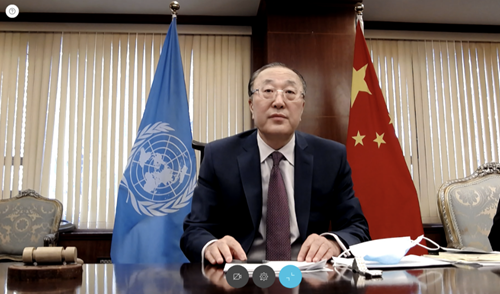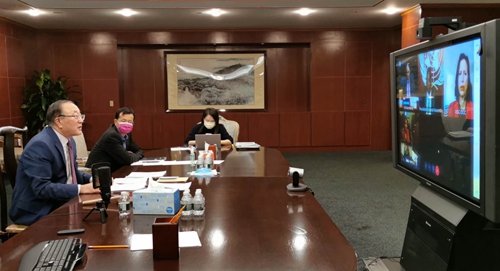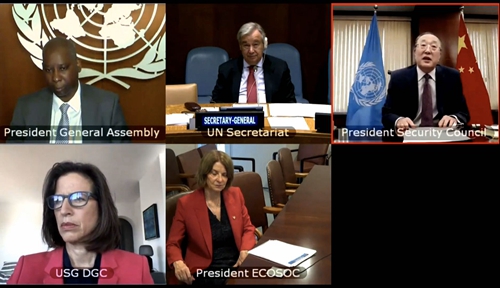| Ambassador Zhang Jun Attended the Joint Briefing by the UN Principal Organs on the COVID-19 Response |
| 2020-03-27 00:37 |
|
On 27 March 2020, Ambassador Zhang Jun, in his capacity as President of the Security Council, attended the·Joint Briefing by the UN Principal Organs to Member States on the COVID-19 Response. Together with President of the General Assembly Mr. Tijjani Muhammad-Bande, President of the Economic and Social Council Ms. Mona Juul and Secretary-General Mr. António Guterres, Ambassador Zhang briefed the Member States of the United Nations about the response and work of the UN Principal Organs in the context of the pandemic, and answered questions of Member States. Member States of the UN participated in the briefing via internet. The briefing was broadcast worldwide via UN Web TV as well as Twitter, Facebook and YouTube. Ambassador Zhang said that COVID-19 has posed a huge challenge to the operation of United Nations organs, including the Security Council. The Security Council has primary responsibility for the maintenance of international peace and security. As President of the Security Council in March 2020, China attaches great importance to the work of the Council and has been working closely with Council Members in addressing challenges brought by the COVID-19 pandemic, and discharging the Council's responsibilities under the UN Charter. First, the Council has adjusted its work plan in a timely manner so as to proactively prevent and control risks. The work of the Council in the first two weeks of March was not seriously affected by the pandemic. Still, the Council took precautionary measures, which included limiting the number of participants from each delegation to 1+2, and changing the venue of consultations to the Council Chamber to reduce the risk of virus spread. As the outbreak worsened in New York City and in view of the relevant arrangements by UN Headquarters, the Council postponed its meetings in the third week of March, and adjusted its meetings this week, with the use of new methods of discussions. Second, the Council is actively exploring new working methods. Because of the worsening of the pandemic, Members of the Council faced more difficulties in holding physical meetings at UN Headquarters. Members of the Council, with the support of the technical department of the Secretariat, set up a VTC system. After repeated testing of the VTC system, the first VTC meeting was held on MONUSCO on 24 March, and on UNSMIL on 26 March. Members of the Council are discussing on a provisional procedure for the adoption of resolutions under current circumstances. Council Members have reached consensus on several draft resolutions. These include draft resolutions on the extension of the mandate of the UNSOM, the troop ceiling rollover of UNAMID, the extension of the mandate of the Panel of Experts of the 1718 Committee and the one on the safety and security of peacekeepers. The President believes that the Council will take action soon on these draft resolutions. Third, the Council is working hard in performing its duties, and responding timely to hotspot issues. Over the past two weeks, Members of the Council have maintained close communications by phone, email, video and other means. The Council issued Press Statements on the attack against the peacekeepers of MINUSCA, and on the terrorist attack in Afghanistan. After the two video conferences held this week, the Council expressed itself through press elements on situation in DRC and Libya. Next week it will also discuss Syria, Afghanistan and other issues via VTC. Though these are video conferences, Council Members can listen to the briefings to get the latest information to ensure that the Council closely follows situations and act promptly. Fourth, the Council is working hard to keep transparency of its work under special circumstances. Due to adjustment of working methods, there are more uncertainties about the work program of the Council at this moment. Council Members fully understand the importance of information access and transparency. In this context, Council Members have tried their best to provide press elements after VTC discussions. The President of the Council also posts announcement on the website and Twitter of the video conference for the next day. With the further improvement of methodology, Member States will have more information access to the work of the Council. Ambassador Zhang said that, COVID-19 is a new challenge. The emergency response and work adjustment by the Council involve many technical, procedural, and legal aspects. Members are in close consultation and working hard to explore ways and means. Ambassador Zhang emphasized that the Council is in action and does not relax in its duties for even a moment. Council Members will continue to communicate and coordinate with other UN organs. While addressing the challenges of the pandemic, Council Members will do whatever they can to fulfill the responsibility for maintaining international peace and security. The Council will live up to its mission as mandated by all Members States of the United Nations. During the briefing, Ambassador Zhang also answered questions from Members States regarding the Council's video conference arrangements, participation of member states, and the impact of the pandemic on peacekeeping operations, etc. |
| |||||||||||||
| |||||||||||||


